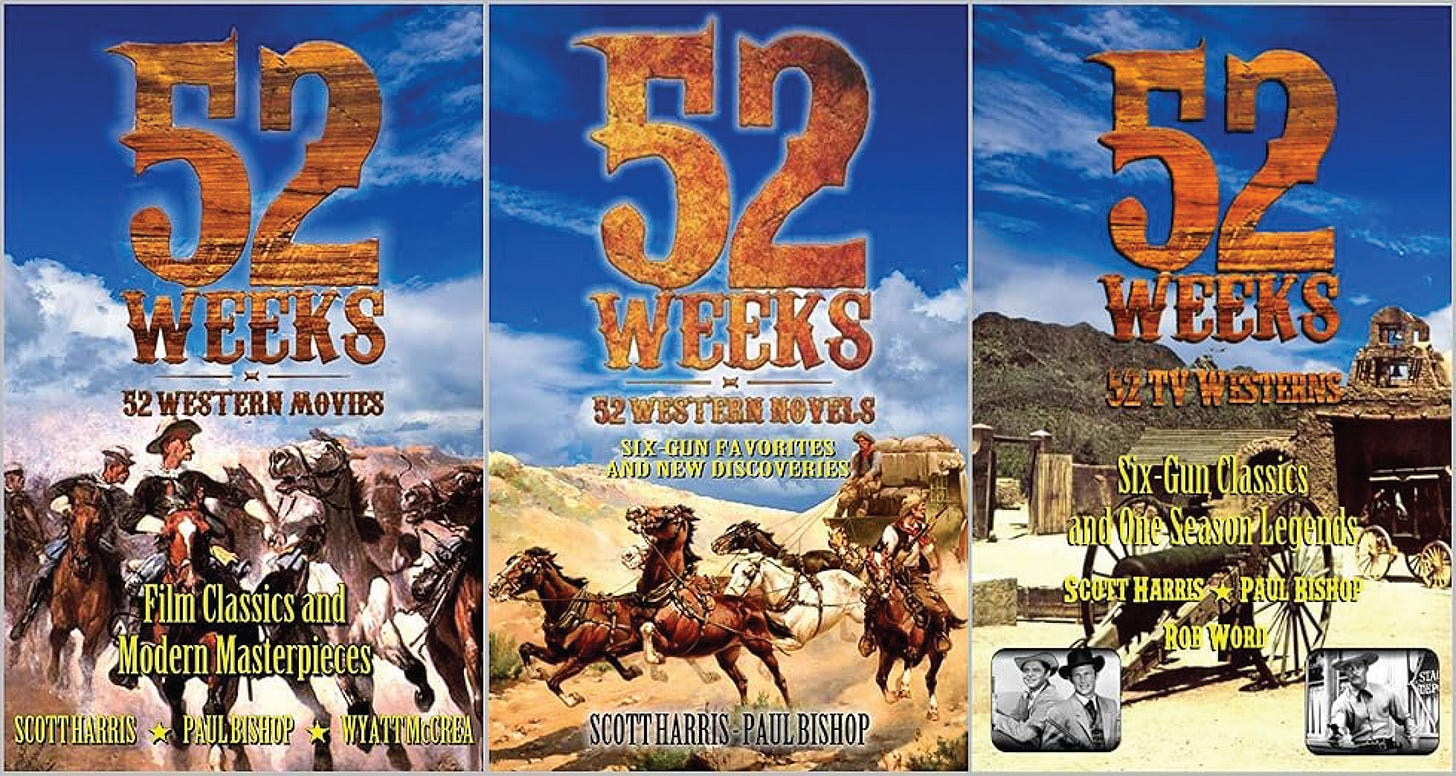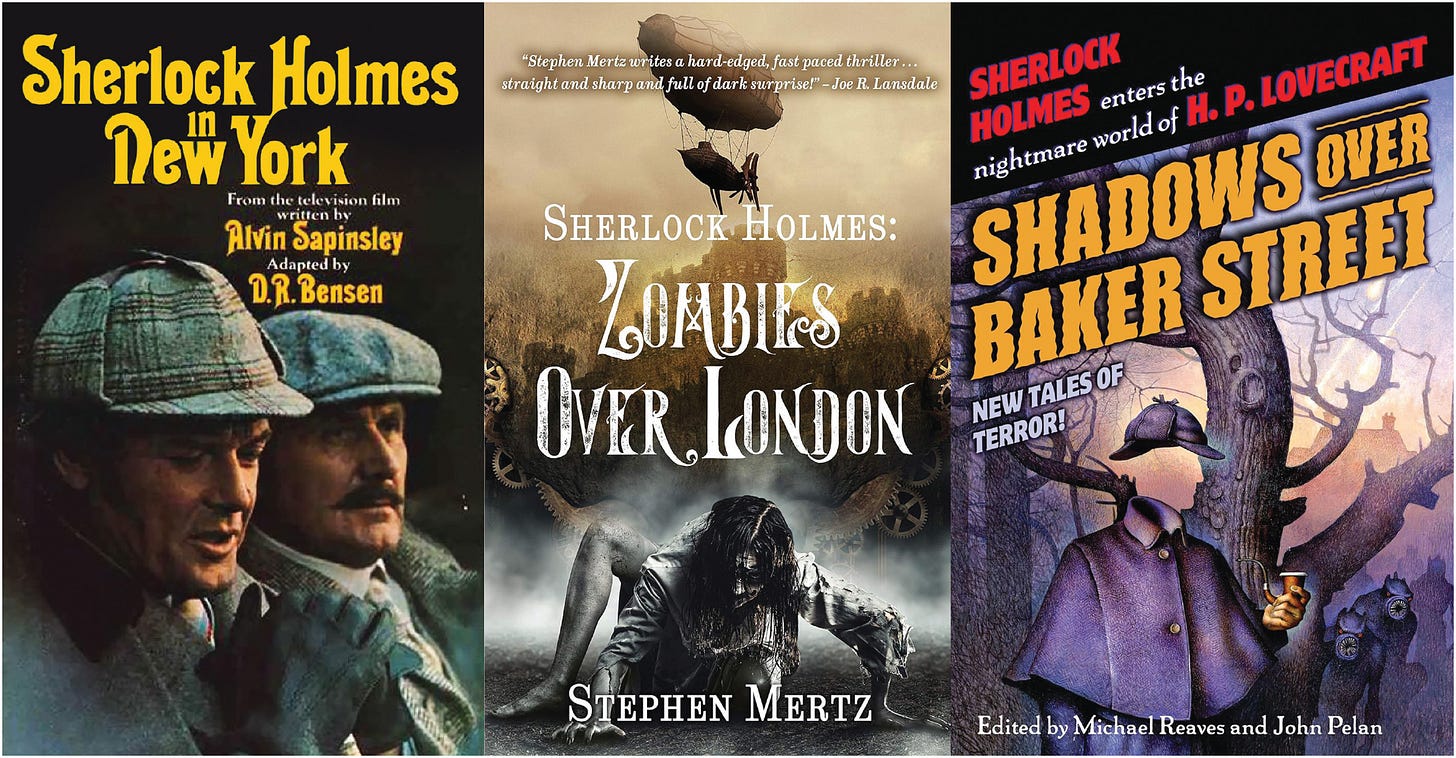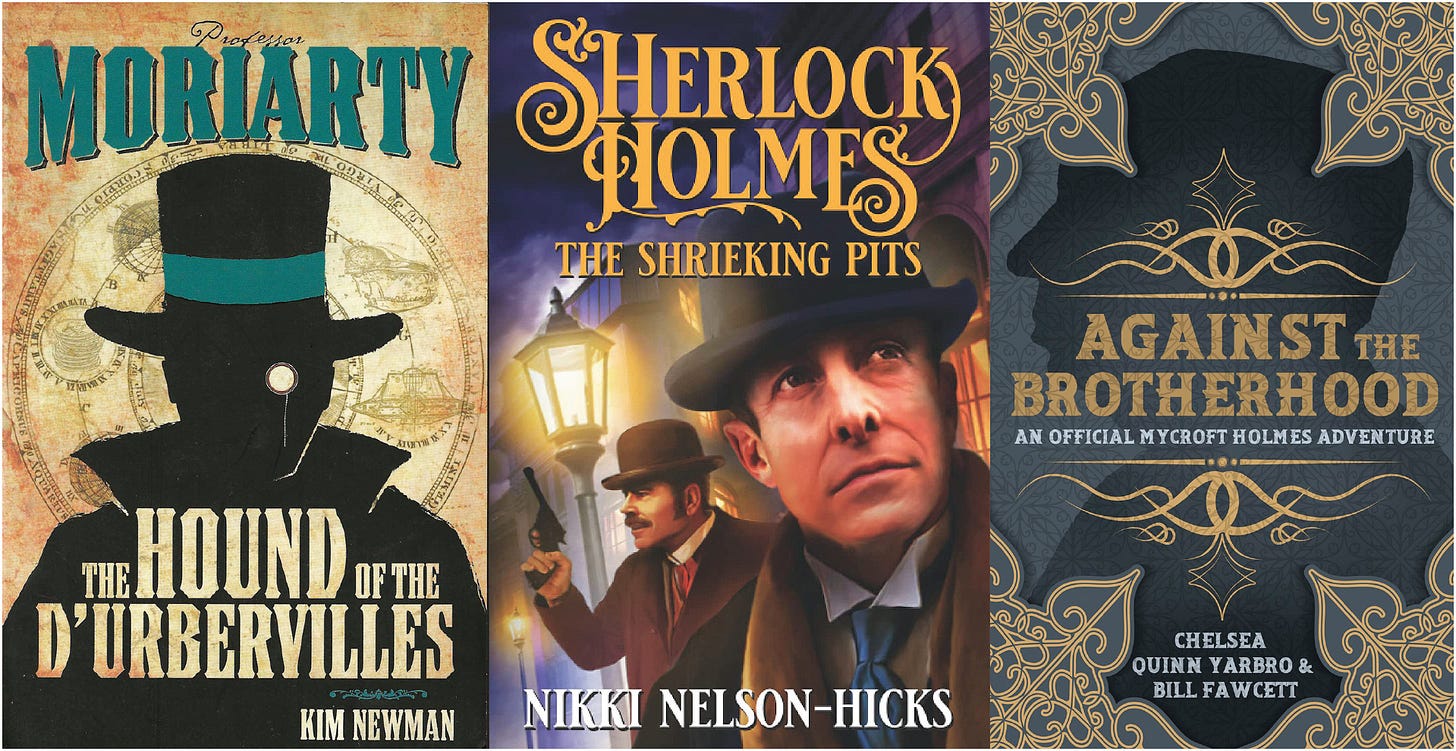A Year in Baker Street: Talking Holmes with Paul Bishop
Paul Bishop Interview: 52 Week - 52 Sherlock Holmes Novels.
I’ll admit it—I’m biased when it comes to 52 Weeks: 52 Sherlock Holmes Novels. I have three essays in the book, so of course I’m going to say nice things about it. But beyond my meagre contribution, there are another 49 weeks’ worth of essays that offer fantastic Sherlockian insight, commentary, and passion. It’s a treasure trove of Holmesian enthusiasm, with contributors ranging from seasoned scholars to lifelong fans, each choosing a favourite pastiche and explaining just why it’s worth your time.
I was honoured to be part of the project—and as a fan of both Holmes and the pastiche tradition, it was a real thrill to sit alongside so many like-minded thinkers.
The man who made it all happen is Paul Bishop. Paul’s a retired LAPD detective, a screenwriter, a novelist, a pulp fiction evangelist, and the driving force behind the Fight Card series. Today, I’m thrilled to sit down with him to talk about Holmes, pastiches, and what inspired 52 Weeks in the first place.
So, Paul, let’s start with the big one—what was the spark behind 52 Weeks: 52 Sherlock Holmes novels? What made you think, yeah, this is the next project?
The genesis of this compendium began taking shape in late 2023 when I returned to my long ago love of Sherlock Holmes with obsessive zeal. After five years immersed in the Western genre as creator and co-host of the award-winning Six-Gun Justice Podcast, it was time for a major change in what my wife calls my enthusiasms.
As I began again exploring the Sherlockian universe, I was amazed at the avalanche of related pastiche novels—or what I term Sherlock adjacent material—on the market with more seemingly being published every day. And it was this sheer breadth of Sherlock Holmes pastiches and the widespread and ongoing fascination with the character that was the real inspiration for the project.
Sherlock Holmes has never gone out of print, and writers from every era have found ways to reimagine him. I wanted to celebrate that legacy, not by focusing solely on Doyle’s canon, but by spotlighting a selection of pastiche novels that expand Holmes' world in creative and unexpected ways. Having done three previous 52 Weeks books (Western Novels, Western Movies, and Western TV Shows), I felt the format would lend itself to the world of Sherlock Holmes.
You’ve wrangled together a wide mix of contributors for this book—scholars, writers, die-hard fans. What was it like working with so many voices, and how did you go about selecting who to include?
The contributors are the real stars of this book. Many of the contributors were on my list of usual suspects—friends and colleagues I knew I could rely on to both participate. Then there is an impressive mix of established Sherlockian scholars, crime writers, journalists, or simply lifelong fans of Holmes who I was able to contact and invite aboard the project. Their backgrounds range from literary analysis to pop culture commentary. What unites them is a shared love for Sherlock Holmes and the creativity to approach these novels from fresh angles. Each essay is deeply personal, often reflecting how that particular novel impacted the contributor or shaped their understanding of Holmes. The diversity of voices adds richness and energy to the project.
I know you’ve been a Holmes fan for a long time—but what is it about Sherlock Holmes that keeps pulling you back in? What’s the hook for you, personally?
The adventures of the Great Detective and his faithful chronicler was one of my earliest enthusiasms. At eight years old, I emigrated with my parents from England to the west coast of America. In the early ‘60s, Southern California was a land of surfers and hot-rodders—a somewhat hostile environment for an only child with prissy English manners and a mother who dressed him funny. But my ever savvy grandmother had given me a copy of The Adventures of Sherlock Holmes as a going away gift and I had devoured it on the Atlantic ocean crossing. Once on dry land in this strange and foreign country, Holmes became my avatar in the face of the Americanisms of Superman, Batman, and Spider-man. He was my superhero and made me brave enough to stand out in my own individuality. While I have pursued many other literary enthusiasms over the years, Sherlock and company have always remained with me either in the background or in patchy foreground moments.
With 52 novels covered in the book, were there any that surprised you—titles you hadn’t read before or had previously written off that changed your mind?
Absolutely. Some contributors chose books that aren’t traditionally viewed as classics within the Holmes pastiche genre—such as Sherlock Holmes In New York, Zombies Over London, or Sherlock Holmes vs. Cthulhu—but they made compelling cases for them. There were also a number of modern reinterpretations placing Holmes in contemporary settings (They Might Be Giants or Holmes, Marple & Poe), or blending him with speculative fiction elements (Warlock Holmes: A Study In Brimstone). Editing these essays reminded me Holmes truly is a character without boundaries—he can exist anywhere, anytime, and still feel like Holmes.
Your own essays in the collection—did you always know which books you were going to write about, or did that take some internal wrangling?
The selection process was wonderfully challenging. I wanted a wide representation: novels from different decades, varying tones—from pastiche to parody to serious literary homage—stories set in Holmes’ own time and others that transported him to different eras and places. I also wanted to include both well-known and underappreciated works. There were a number of titles I might have chosen to write about, but I was happy when other contributors chose to feature them. As a result, my essays included a couple of favorites (such as Holmes On The Range and A Study In Crimson) as well as a couple of titles I felt would round out the collection (such as Elementary, She Read and Elementary: The Ghost Line—which are not related). And there were a number of titles that went to my editorial crew to again fill in any spots we felt had not been covered (such as Hound Of The D’Ubervilles, Sherlock Holmes: The Shrieking Pits, and Against The Brotherhood).
The book focuses on pastiches—but have you ever been tempted to write a Holmes pastiche yourself? Or are you happy playing in the critic/curator space for now?
Believe it or not, I recently finished my first Sherlockian pastiche, Sherlock Holmes Versus The Scourge. It still needs a rewrite or two, then I’ll try to find a home for it. I also have a collection of Holmes related essays I’ve written (currently entitled The Sherlock Chronicles) on various aspects of the Sherlockian universe that will also probably see the light of publication.
You’ve tackled Holmes in fiction—any plans to turn your attention to Holmes on screen? A companion book on Sherlock Holmes in film or television could be amazing.
It’s very possible. This first outing was limited to novel length pastiches (with a few editorially approved exceptions). However, it is Holmesian short story collections that are most prolific in the pastiche world and it might be fun to look at 52 of those short story collections.
You’ve had such a varied creative life—cop, novelist, editor, podcast host. How does 52 Weeks fit into the bigger arc of your career? Was this a passion project, or something that surprised you along the way?
52 Weeks 52 Sherlock Holmes Novels was definitely a passion project. I had no problem self-publishing it, but was very fortunate to engage with an excellent publisher—Genius Books—who caught the same vision as I had for the project (I’m looking at you Steven Booth) and were a joy to have on the team.
If someone’s new to the world of Holmes pastiches, do you have one or two can’t miss novels you always recommend to get them started?
When I first returned to my passion for Sherlock Holmes, it was the pastiche A Study In Crimson by Robert J. Harris that sparked my imagination. Like the most popular of the Basil Rathbone / Nigel Bruce films, it is set in 1942, which I found a very interesting updating and worth recommending to anyone wanting to dip into the world of Sherlockian pastiches. Another great series of pastiches I would recommend to newcomers are the Enola Holmes novels my Nancy Springer, which are terrific fun.
And finally, now that 52 Weeks is out in the wild—what’s next on your creative radar? Another volume? Something entirely different? Or just a long nap and a cup of tea?
I’m always up for a long nap and a cup of tea, but at this point in my life I’m like a shark that has to keep swimming to breath. So, at this particular moment, I’m still casting around for a new creative outlet—a new podcast, a new novel, or something wild and out of the ordinary, and I can’t wait to get on with it…
Thanks, Paul, for taking the time to chat—and more importantly, for inviting me to be a small part of 52 Weeks: 52 Sherlock Holmes Novels. It’s a real honour to share pages with so many passionate, insightful Holmesians, and I’m grateful to have been along for the ride. Here’s to more mysteries, more pastiches, and more adventures with the Great Detective.
If you enjoyed this interview and want to explore more Holmesian treasures, be sure to pick up a copy of 52 Weeks: 52 Sherlock Holmes Novels, published by Genius Books and available now at BakerStreetGenius.com. It’s an essential addition to any Sherlockian bookshelf—whether you're a longtime devotee or just beginning your journey into the fog-filled streets of Victorian mystery.
And if you're after more curious cases from 221B, you might also enjoy my book: Baker Street: The Curious Casefiles of Sherlock Holmes—a deep-dive into the enduring legacy, lore, and eccentricities of the world’s greatest detective.
David Foster is an Australian best-selling author who writes under the pen names James Hopwood, A.W. Hart, and Jack Tunney. Under the latter, he has contributed three titles to the popular Fight Card series. His short fiction has been published in over 50 publications worldwide, including by Clan Destine Press, Wolfpack Publishing, and Pro Se Productions, to name but a few. In 2015, he contributed to the multi-award-winning anthology Legends of New Pulp Fiction, published by Airship 27 Publishing.
Foster’s non-fiction work appeared in the award-winning Crime Factory Magazine, as well as contributing numerous articles exploring pulp fiction in popular culture to Girl Gangs, Biker Boys, and Real Cool Cats: Pulp Fiction and Youth Culture, 1950 to 1980 (2017, PM Press) and Sticking It To The Man: Revolution and Counterculture in Pulp and Popular Fiction, 1950 to 1980 (2019, PM Press). He has also contributed articles on the ANZAC war experience to Remembrance (2024, Union Street 21).
Foster lives in the old Pentridge Prison Complex, behind high grey stone walls, in inner-suburban Melbourne, Australia.








